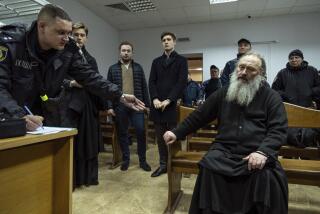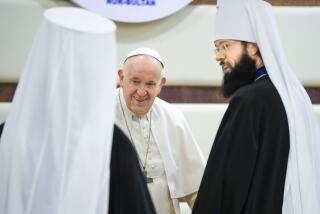Russian Orthodox Patriarch Pimen Dies at 79 : Religion: His passing clears the way for deep reform in the church. He tended to support Kremlin policies.
- Share via
MOSCOW — Pimen, patriarch of Moscow and all Russia, died Thursday at age 79, clearing the way for deep change in the Russian Orthodox Church, the 1,000-year-old institution said by critics to resist reform more stubbornly than the Soviet Communist Party.
Since 1971 and the now-derided era of Soviet leader Leonid I. Brezhnev, Pimen had been spiritual head of the country’s Orthodox believers, who number as many as 50 million.
In recent years he clearly became too infirm for the job. When priests last October celebrated the first religious service in the Kremlin’s Church of the Assumption since the Bolshevik era, the frail and white-bearded patriarch, visibly ailing, had to be carried back to his limousine.
Orthodox activists said Pimen’s history of compromise with the Soviet government and his poor health meant that their long-suppressed church has not seized opportunities made possible by the reforms of President Mikhail S. Gorbachev.
Gorbachev received Pimen in the Kremlin in April, 1988, for the first talks between a Russian Orthodox patriarch and Soviet leader since World War II. He said then that the church has a clear role to play in helping effect the changes in society that are the chief goals of his perestroika program for economic and social restructuring.
It was a striking shift in Soviet policy, which had previously sought to circumscribe church action or even brutally eradicate religious faith.
In a message read on state-run television news, the Holy Synod of the Russian church reported Pimen’s passing “with deep sorrow,” but it gave no clue as to the cause of death.
The synod met Thursday night in Moscow, preparing to elect an acting patriarch. By tradition, a permanent successor is to be chosen within six months by another church body, the Local Council, which is composed of all metropolitans, archbishops and bishops as well as representatives of both clergy and laity.
The act of choosing a new Russian patriarch is certain to unleash high-level debate about religion’s place in Soviet society and the degree of independence that the church should seek.
Pimen’s path was to defer to the Kremlin by giving, for example, seemingly knee-jerk approval to its foreign policy and arms control initiatives and by never raising the church’s voice against human rights abuses or social policies now acknowledged to have been grave errors.
“Pimen’s place in history was similar to Brezhnev’s,” said Orthodox activist Mikhail Osadchi, linking the church leader with what is now publicly termed the “era of stagnation.” He said believers want the next patriarch to be like Tikhon, who was named to the post in 1917 and set a course independent of the fledgling Soviet government.
Under Pimen’s stewardship, the church paid millions of rubles annually into the coffers of the Soviet Peace Fund, an officially sanctioned social organization created to push Kremlin foreign policy goals. Pimen also traveled to the United Nations in New York, to Berlin, Budapest and elsewhere to endorse the words and deeds of Soviet leaders at international conferences and meetings.
Pimen’s church has also fought bitterly to hang on to the real estate and parishioners it gained in the western Ukraine in 1946 when dictator Josef Stalin forced the Ukrainian Catholic Church to merge with Russian Orthodoxy and relinquish both its believers and sanctuaries.
Disapproval of Pimen surged into view under the freer climate of opinion inaugurated by Gorbachev. In 1988, as the church prepared to celebrate the millennium of Russian Christianity, dissident priest Gleb Yakunin and his followers sent Pimen a letter asserting that he was too old, sick and discredited by his lack of independence to take real advantage of Gorbachev-era freedoms.
“We are obliged to tell you the truth . . . that you, your holiness, are so weakened by your ailments that you are not in a condition to bear the burden of patriarchal service,” the dissidents said.
Counterattacking, Pimen accused his critics of sowing the seeds of temptation and discord and of violating church discipline. He said they should be dealt with on the basis of a “strict pastoral approach and healing guardianship of the soul.”
Pimen, whose given name was Sergei M. Izvekov, was born July 23, 1910, into a family of civil servants in the Moscow region. At 17, he took monastic vows and went on to serve as father superior of the Trinity-St. Sergei Monastery in Zagorsk, the country’s most important, in 1954-57.
He became a bishop in 1957 and was appointed business manager of the Moscow patriarchate three years later, in 1960. That year he also became an archbishop and a permanent member of the Holy Synod.
He was named a member of the Congress of People’s Deputies, the new Soviet Parliament, last year.
More to Read
Sign up for Essential California
The most important California stories and recommendations in your inbox every morning.
You may occasionally receive promotional content from the Los Angeles Times.










